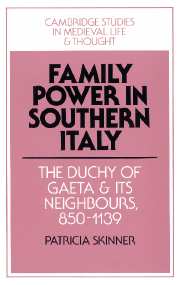Book contents
- Frontmatter
- Contents
- List of illustrations
- Preface
- List of abbreviations
- INTRODUCTION
- 1 SOURCES
- PART I FROM THE BEGINNINGS TO THE ELEVENTH CENTURY
- PART II A TIME OF CHANGE: THE ELEVENTH CENTURY AND BEYOND
- PART III THE ECONOMICS OF POWER
- CONCLUSION
- Appendix: Greek signatures in Neapolitan documents
- Bibliography
- Index
- Cambridge Studies in Medieval Life and Thought Fourth Series
- Frontmatter
- Contents
- List of illustrations
- Preface
- List of abbreviations
- INTRODUCTION
- 1 SOURCES
- PART I FROM THE BEGINNINGS TO THE ELEVENTH CENTURY
- PART II A TIME OF CHANGE: THE ELEVENTH CENTURY AND BEYOND
- PART III THE ECONOMICS OF POWER
- CONCLUSION
- Appendix: Greek signatures in Neapolitan documents
- Bibliography
- Index
- Cambridge Studies in Medieval Life and Thought Fourth Series
Summary
What contribution can an examination of a tiny duchy like that of Gaeta and its neighbours make to our understanding of early medieval political and economic life? Does its history have a significance beyond southern Italy, let alone the borders of Italy as a whole?
The history of the duchy of Gaeta is one of contradictions. Documents of the tenth century present the image of a duke whose territory, if not large, was united and firmly ruled by his powerful family. Yet, as we have seen, the base from which he chose to rule had never been the natural centre of that territory. It was chosen because of the need for a defensive site in the face of Arab incursions and, perhaps, because the Docibilans were making a deliberate break with the old centres of papal administration for the area, Fondi and Traetto. This created internal tensions and led ultimately to the reassertion of the older pattern of a fortress on the peninsula and two separate jurisdictions. The major achievement of Docibilis and his clan is that for a century they were able to paper over these natural divisions and forcibly create a duchy.
What though, did the creation of the duchy of Gaeta entail? The answer to this question is to be found in the surviving documentary evidence from Gaeta, which is so unusual as to be worthy of examination by medieval historians working in other areas.
- Type
- Chapter
- Information
- Family Power in Southern ItalyThe Duchy of Gaeta and its Neighbours, 850–1139, pp. 293 - 303Publisher: Cambridge University PressPrint publication year: 1995



